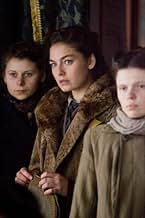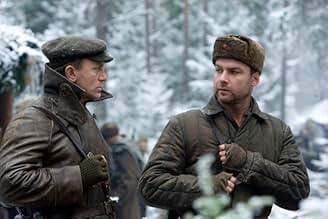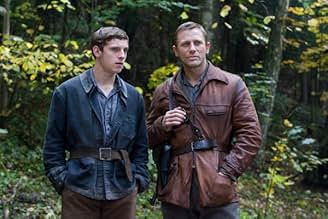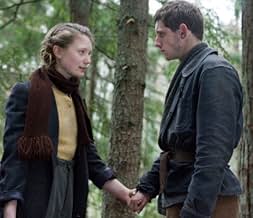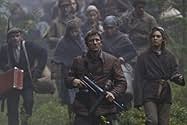Des frères juifs d'Europe de l'Est occupés par les nazis s'échappent dans les forêts de Biélorussie, où ils se joignent aux résistants russes, et s'efforcent de construire un village pour pr... Tout lireDes frères juifs d'Europe de l'Est occupés par les nazis s'échappent dans les forêts de Biélorussie, où ils se joignent aux résistants russes, et s'efforcent de construire un village pour protéger un millier de civils juifs.Des frères juifs d'Europe de l'Est occupés par les nazis s'échappent dans les forêts de Biélorussie, où ils se joignent aux résistants russes, et s'efforcent de construire un village pour protéger un millier de civils juifs.
- Réalisation
- Scénario
- Casting principal
- Nommé pour 1 Oscar
- 2 victoires et 5 nominations au total
Avis à la une
This is an interesting film about a bunch of Jews commanded by the Bielski brothers taking the Belorussia forests to shelter themselves from Nazi criminals . It is completely set in the woods which it does some claustrophobic . Splendid acting by all-star-cast . Nicely photographed by Eduardo Serra in colorful palette . Emotive and sensitive musical score by the great composer James Newton Howard. This is a true story , worth telling and stunningly directed in old-style by Edward Zwick .
The picture is inspired on real events based on the novel titled ¨Defiance : The Balski partisans¨ , being well adapted by Clayton Frohman and Edward Zwick . The actual events are the followings : The Bielski group's partisan (three brothers finely performed by Daniel Craig , Liev Schriever , Jamie Bell) activities were aimed to hold the Jewish community together and fight against the Nazis and their collaborators, such as Belarusian volunteer policemen or local inhabitants who had betrayed or killed Jews. They also conducted sabotage missions . The Nazi regime offered a reward for assistance in the capture of Tuvia (Daniel Craig) Bielski, and in 1943, led major clearing operations against all partisan groups in the area. Some of these groups suffered major casualties, but the Bielski partisans fled safely to a more remote part of the forest , and continued to offer protection to the noncombatants among their band . The Bielski group would raid nearby villages and forcibly seize food ; on occasion peasants who refused to share their food with the partisans were the subject of violence and even murder. This caused hostility towards the partisans from peasants in the villages, though some would help the Jewish partisans.The Bielski partisans eventually became affiliated with Soviet organisations in the vicinity of the Naliboki Forest under Russian General (in the movie Panchenko is played by Ravil Isyanov). Several attempts by Soviet partisan commanders to absorb Bielski fighters into their units were resisted, such that the Jewish partisan group retained its integrity and remained under Tuvia Bielski's command. This allowed him to continue in his dedication to protect Jewish lives along with engaging in combat activity, but would also prove a problem later on . The Bielski partisan leaders split the group into two units, one named Ordzhonikidze, led by Zus (Liev Schreiber), and the other Kalinin, commanded by Tuvia (Daniel Craig). According to partisan documentation , Bielski fighters from both units killed a total of 381 enemy fighters , sometimes during joint actions with Soviet groups. 50 members of the group were killed. In the summer of 1944, when the Soviet counteroffensive began in Belarus and the area was taken over by the Soviets, the Kalinin unit , numbering 1,230 men, women and children, emerged from the forest and marched into Nowogrodek.Despite their previous collaboration with the Soviets, relations quickly worsened. The NKVD started interrogating the Bielski brothers about the rumours of loot they had reportedly collected during the war, and about their failure to "implement socialist ideals in the camp". Asael Bielski (Jamie Bell) was conscripted into the Soviet Red Army and fell in the Battle of Königsberg in 1945. The remaining brothers escaped Soviet-controlled lands, emigrating West. After the war, Tuvia Bielski returned to Poland, then emigrated to present-day Israel in 1945. Tuvia and Zus eventually settled in the United States. They operated a successful trucking business. When Tuvia died in 1987, he was buried in Long Island, NY, but a year later, at the urging of surviving partisans in Israel, he was exhumed and given a hero's funeral at the hillside graveyard in Jerusalem. His wife, Lilka (Alexa Davalos), was buried beside him in 2001 . None of the Bielskis ever sought any recognition or reward for their actions.
The picture is inspired on real events based on the novel titled ¨Defiance : The Balski partisans¨ , being well adapted by Clayton Frohman and Edward Zwick . The actual events are the followings : The Bielski group's partisan (three brothers finely performed by Daniel Craig , Liev Schriever , Jamie Bell) activities were aimed to hold the Jewish community together and fight against the Nazis and their collaborators, such as Belarusian volunteer policemen or local inhabitants who had betrayed or killed Jews. They also conducted sabotage missions . The Nazi regime offered a reward for assistance in the capture of Tuvia (Daniel Craig) Bielski, and in 1943, led major clearing operations against all partisan groups in the area. Some of these groups suffered major casualties, but the Bielski partisans fled safely to a more remote part of the forest , and continued to offer protection to the noncombatants among their band . The Bielski group would raid nearby villages and forcibly seize food ; on occasion peasants who refused to share their food with the partisans were the subject of violence and even murder. This caused hostility towards the partisans from peasants in the villages, though some would help the Jewish partisans.The Bielski partisans eventually became affiliated with Soviet organisations in the vicinity of the Naliboki Forest under Russian General (in the movie Panchenko is played by Ravil Isyanov). Several attempts by Soviet partisan commanders to absorb Bielski fighters into their units were resisted, such that the Jewish partisan group retained its integrity and remained under Tuvia Bielski's command. This allowed him to continue in his dedication to protect Jewish lives along with engaging in combat activity, but would also prove a problem later on . The Bielski partisan leaders split the group into two units, one named Ordzhonikidze, led by Zus (Liev Schreiber), and the other Kalinin, commanded by Tuvia (Daniel Craig). According to partisan documentation , Bielski fighters from both units killed a total of 381 enemy fighters , sometimes during joint actions with Soviet groups. 50 members of the group were killed. In the summer of 1944, when the Soviet counteroffensive began in Belarus and the area was taken over by the Soviets, the Kalinin unit , numbering 1,230 men, women and children, emerged from the forest and marched into Nowogrodek.Despite their previous collaboration with the Soviets, relations quickly worsened. The NKVD started interrogating the Bielski brothers about the rumours of loot they had reportedly collected during the war, and about their failure to "implement socialist ideals in the camp". Asael Bielski (Jamie Bell) was conscripted into the Soviet Red Army and fell in the Battle of Königsberg in 1945. The remaining brothers escaped Soviet-controlled lands, emigrating West. After the war, Tuvia Bielski returned to Poland, then emigrated to present-day Israel in 1945. Tuvia and Zus eventually settled in the United States. They operated a successful trucking business. When Tuvia died in 1987, he was buried in Long Island, NY, but a year later, at the urging of surviving partisans in Israel, he was exhumed and given a hero's funeral at the hillside graveyard in Jerusalem. His wife, Lilka (Alexa Davalos), was buried beside him in 2001 . None of the Bielskis ever sought any recognition or reward for their actions.
I enjoyed "Defiance" immensely -- there was humor and heartache, with a liberal dose of action. Not a brainless action movie, enough of a story to make it memorable, and fast-paced enough to keep me from becoming bored.
On the other hand, although the movie captures the spirit of the story, it is far from a documentary, and I'd have preferred a more historically accurate film. I'm biased, though -- I read the Peter Duffy book "Bielski Brothers" soon after it was released ("Defiance" is based on a different book), and I found the real story even more compelling than the Hollywood version.
Nonetheless, I live in the real world where directors have to shoot on a budget, and this was a good, diverting peek into a story that was long overdue to be told.
On the other hand, although the movie captures the spirit of the story, it is far from a documentary, and I'd have preferred a more historically accurate film. I'm biased, though -- I read the Peter Duffy book "Bielski Brothers" soon after it was released ("Defiance" is based on a different book), and I found the real story even more compelling than the Hollywood version.
Nonetheless, I live in the real world where directors have to shoot on a budget, and this was a good, diverting peek into a story that was long overdue to be told.
Read more at http://FrameRate.blog.com
When most people learn about World War II during their American History classes, they hear all about the major stories and the major players: D-Day, Eisenhower, the Holocaust, Hitler, Axis vs. Allies, Battle of the Bulge, but there are literally thousands of lesser-known stories from that era that many have not yet heard. It was one such obscure story that is the basis for the film Defiance, starring Daniel Craig.
The film begins with a familiar theme -- Nazi soldiers rounding up Jews in Western Europe. The grainy, black-and-white style tells us that this is a true story. However, as events unfold, we realize that this isn't the Holocaust story that we're accustomed to seeing in films like Schindler's List. In fact, it's a story about hundreds of Jews who fight for survival as free men and women in the dense and expansive forests of Nazi-occupied Poland.
Daniel Craig gives perhaps one of his best performances as Tuvia Bielski, the eldest of four Jewish brothers and the eventual leader of the Bielski partisans. Although the Bielski's and fellow Jews are forced to watch as their people are rounded up and killed by the Nazis, Tuvia wants to avoid becoming a group of vigilantes. The conflict arises from younger brother Zus (Liev Schreiber) who desperately wants to avenge the deaths of those he loved. Tuvia is conflicted by the knowledge that in extreme circumstances one must often take extreme measures in order to survive and protect others.
Throughout the film tension is woven by utilizing a number of different methods, all of which make the movie much more compelling. First, as mentioned, is the conflict between fighting and surviving. Second, is the suspense created by the knowledge that the Nazis are closing in around them. Third is the conflict between the Bielskis and the local police who are loyal to the Nazis. Fourth is the inner struggles the Bielskis face when some of their own decide to cause disagreements and divisions. For those unfamiliar with the story, the fate of the Bielskis is constantly in doubt.
The cinematography of the film is gray and muted, reflective of the somber tone of the subject matter. The musical score is reminiscent of John William's score in Schindler's List -- soft and sad with the cello and violin taking the melody. In some ways it feels that Defiance takes its visual cues from Schindler's List as well; there's something about the look of the movie that seems familiar. The battle scenes are similar in style to Saving Private Ryan, complete with the dazed, ringing-in-the-ears experience following a grenade that goes off too close to Tuvia. I would have appreciated a more unique perspective to the aesthetics of the film to coincide with the uniqueness of the story.
In all, Defiance is an important story that needs to be heard. Daniel Craig leads a great cast of characters in an emotional journey of community, camaraderie, and hope.
When most people learn about World War II during their American History classes, they hear all about the major stories and the major players: D-Day, Eisenhower, the Holocaust, Hitler, Axis vs. Allies, Battle of the Bulge, but there are literally thousands of lesser-known stories from that era that many have not yet heard. It was one such obscure story that is the basis for the film Defiance, starring Daniel Craig.
The film begins with a familiar theme -- Nazi soldiers rounding up Jews in Western Europe. The grainy, black-and-white style tells us that this is a true story. However, as events unfold, we realize that this isn't the Holocaust story that we're accustomed to seeing in films like Schindler's List. In fact, it's a story about hundreds of Jews who fight for survival as free men and women in the dense and expansive forests of Nazi-occupied Poland.
Daniel Craig gives perhaps one of his best performances as Tuvia Bielski, the eldest of four Jewish brothers and the eventual leader of the Bielski partisans. Although the Bielski's and fellow Jews are forced to watch as their people are rounded up and killed by the Nazis, Tuvia wants to avoid becoming a group of vigilantes. The conflict arises from younger brother Zus (Liev Schreiber) who desperately wants to avenge the deaths of those he loved. Tuvia is conflicted by the knowledge that in extreme circumstances one must often take extreme measures in order to survive and protect others.
Throughout the film tension is woven by utilizing a number of different methods, all of which make the movie much more compelling. First, as mentioned, is the conflict between fighting and surviving. Second, is the suspense created by the knowledge that the Nazis are closing in around them. Third is the conflict between the Bielskis and the local police who are loyal to the Nazis. Fourth is the inner struggles the Bielskis face when some of their own decide to cause disagreements and divisions. For those unfamiliar with the story, the fate of the Bielskis is constantly in doubt.
The cinematography of the film is gray and muted, reflective of the somber tone of the subject matter. The musical score is reminiscent of John William's score in Schindler's List -- soft and sad with the cello and violin taking the melody. In some ways it feels that Defiance takes its visual cues from Schindler's List as well; there's something about the look of the movie that seems familiar. The battle scenes are similar in style to Saving Private Ryan, complete with the dazed, ringing-in-the-ears experience following a grenade that goes off too close to Tuvia. I would have appreciated a more unique perspective to the aesthetics of the film to coincide with the uniqueness of the story.
In all, Defiance is an important story that needs to be heard. Daniel Craig leads a great cast of characters in an emotional journey of community, camaraderie, and hope.
As Nazi forces sweep through Eastern Europe in 1941 the Bielski brothers (Daniel Craig, Liev Schreiber and Jamie Bell) seek refuge in the deep forests on the border of Poland and Belorussia (Belarus). More and more desperate Jews join their ranks for common protection and to oppose the occupying Germans. How can they all survive in the woods during the next four years of war?
Released in 2008-2009, "Defiance" is a drama/war film that has a lot going for it: a story based on actual events, good actors, authentic locations (filmed in Lithuania, a mere 100 miles or so from the actual sites), effective cinematography and a quality score. I personally love survival-type films and "Defiance" fills the bill, although it's not great like, say, "The Last of the Mohicans" (1992).
The filmmakers throw in all kinds of dynamic things to maintain the viewer's attention: Numerous gun battles, an airstrike and a tank, which are all faithful Hollywood-isms. It would've been better to simply focus on the characters and their gritty survival story. How about a deeper examination of individuals reduced to basic necessities? What about a study of people stripped of all civilized influences, struggling with the animalistic side of their psyche, as depicted in the excellent "Sands of the Kalahari" (1965)? How about the immaterial yet palpable bond of love which unites and gives life even in the worst possible conditions? There's some of this, of course, but I wanted it to go deeper, like in "The Flight of the Phoenix" (1965).
One thought-provoking scene concerns a man seeking to join the ever-growing group in the woods wherein he is asked what he does in order to determine how best to utilize his skills. He ponders it a moment and replies that he's "an intellectual." There's of course little use for an intellectual in such a forest community. The region was largely agrarian and so the peasant-types were skilled in at least one practical area as farmers, craftsmen or laborers. But what use was an "intellectual"?
How many of us are intellectuals and would largely be useless in such a scenario? We'd learn new skills real quick, huh? So the picture works on a what-if level: How long will our present society endure as it is before many of us are forced to live primitively in the sticks? If that happens, I hope you're more than just "an intellectual."
"Defiance" is worthwhile if the survival-in-the-woods plot piques your interest. It's superior to the similar "Tears of the Sun" (2003), but IMHO not quite as good as "Hornet's Nest" (1970) and "Sands of the Kalahari," although it's not far off.
The movie runs 2 hours, 17 minutes.
GRADE: B/B-
Released in 2008-2009, "Defiance" is a drama/war film that has a lot going for it: a story based on actual events, good actors, authentic locations (filmed in Lithuania, a mere 100 miles or so from the actual sites), effective cinematography and a quality score. I personally love survival-type films and "Defiance" fills the bill, although it's not great like, say, "The Last of the Mohicans" (1992).
The filmmakers throw in all kinds of dynamic things to maintain the viewer's attention: Numerous gun battles, an airstrike and a tank, which are all faithful Hollywood-isms. It would've been better to simply focus on the characters and their gritty survival story. How about a deeper examination of individuals reduced to basic necessities? What about a study of people stripped of all civilized influences, struggling with the animalistic side of their psyche, as depicted in the excellent "Sands of the Kalahari" (1965)? How about the immaterial yet palpable bond of love which unites and gives life even in the worst possible conditions? There's some of this, of course, but I wanted it to go deeper, like in "The Flight of the Phoenix" (1965).
One thought-provoking scene concerns a man seeking to join the ever-growing group in the woods wherein he is asked what he does in order to determine how best to utilize his skills. He ponders it a moment and replies that he's "an intellectual." There's of course little use for an intellectual in such a forest community. The region was largely agrarian and so the peasant-types were skilled in at least one practical area as farmers, craftsmen or laborers. But what use was an "intellectual"?
How many of us are intellectuals and would largely be useless in such a scenario? We'd learn new skills real quick, huh? So the picture works on a what-if level: How long will our present society endure as it is before many of us are forced to live primitively in the sticks? If that happens, I hope you're more than just "an intellectual."
"Defiance" is worthwhile if the survival-in-the-woods plot piques your interest. It's superior to the similar "Tears of the Sun" (2003), but IMHO not quite as good as "Hornet's Nest" (1970) and "Sands of the Kalahari," although it's not far off.
The movie runs 2 hours, 17 minutes.
GRADE: B/B-
James Bond and Oscar winning director Ed Zwick take on the Nazis.
Saw a preview screening of DEFIANCE last week in Woodland Hills. Daniel Craig stars as Tuvia Bielski in the true WWII story of three Jewish brothers who hid in the Belorussian forests and built a community of partisan fighters, saving over 1200 Jews by war's end.
Liev Schreiber (Zus Bielski) and Jamie Bell (Asael Bielski) star alongside Craig as his two younger brothers. Both Craig and Schreiber give powerhouse performances as the older brothers competing for leadership, and Jamie Bell, who most recently starred in the abysmal Jumper, gives a surprisingly great performance as well.
Zwick has created one of the most beautiful and thought provoking films of his career and definitely one of the most Oscar worthy movies to hit cinemas in years. War and destruction has never been so captivating and moving. There have been dozens of war movies in recent years but none have left me caring so much or feeling so attached to the characters. My eyeballs wouldn't break from the screen for the full 120 mins, and by the film's end, I wasn't ready to stop watching. I can't wait for the release (which appears to be some time this winter) in order to see it again.
It's a superb film with a nice balance of heavy hitting action and intense drama, but if that's not enough to make you want to see it, just the fact that these on screen heroes existed in real life definitely make it worth the watch.
This is a WWII movie that doesn't hide or glamorize war but shows the intense reality of what happens when people band together against overwhelming evil and survive.
A solid 8.5/10
Saw a preview screening of DEFIANCE last week in Woodland Hills. Daniel Craig stars as Tuvia Bielski in the true WWII story of three Jewish brothers who hid in the Belorussian forests and built a community of partisan fighters, saving over 1200 Jews by war's end.
Liev Schreiber (Zus Bielski) and Jamie Bell (Asael Bielski) star alongside Craig as his two younger brothers. Both Craig and Schreiber give powerhouse performances as the older brothers competing for leadership, and Jamie Bell, who most recently starred in the abysmal Jumper, gives a surprisingly great performance as well.
Zwick has created one of the most beautiful and thought provoking films of his career and definitely one of the most Oscar worthy movies to hit cinemas in years. War and destruction has never been so captivating and moving. There have been dozens of war movies in recent years but none have left me caring so much or feeling so attached to the characters. My eyeballs wouldn't break from the screen for the full 120 mins, and by the film's end, I wasn't ready to stop watching. I can't wait for the release (which appears to be some time this winter) in order to see it again.
It's a superb film with a nice balance of heavy hitting action and intense drama, but if that's not enough to make you want to see it, just the fact that these on screen heroes existed in real life definitely make it worth the watch.
This is a WWII movie that doesn't hide or glamorize war but shows the intense reality of what happens when people band together against overwhelming evil and survive.
A solid 8.5/10
Le saviez-vous
- AnecdotesThe film was shot in a remote, wooded area in Lithuania, about a hundred miles away from the real location of the Bielski brothers camp.
- GaffesZus and some others go to the police station to get Ampicillin to treat the pneumonia that is common in the camp. Ampicillin did not come into clinical use until 1961. Even "simple" penicillin would not have been available in Belorussia in the early 1940s.
- Citations
Tuvia Bielski: Our revenge is to live.
- ConnexionsFeatured in 2009 Golden Globe Awards (2009)
Meilleurs choix
Connectez-vous pour évaluer et suivre la liste de favoris afin de recevoir des recommandations personnalisées
Détails
Box-office
- Budget
- 32 000 000 $US (estimé)
- Montant brut aux États-Unis et au Canada
- 28 644 813 $US
- Week-end de sortie aux États-Unis et au Canada
- 123 513 $US
- 4 janv. 2009
- Montant brut mondial
- 51 262 751 $US
- Durée2 heures 17 minutes
- Couleur
- Mixage
- Rapport de forme
- 1.85 : 1
Contribuer à cette page
Suggérer une modification ou ajouter du contenu manquant










